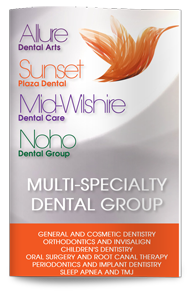Remedies for Sensitive Teeth

Sensitive teeth can be very frustrating. We all want to enjoy our favorite foods and drinks – such as ice cream or tea – without experiencing pain along with the good tastes. Teeth can become sensitive in many ways.
• Receding gums. Gums often recede as a result of gum disease. When the gum tissue pulls back, an unprotected area of the tooth’s dentin is exposed. Dentin is very porous, which means that the nerves of the tooth will be affected by extreme temperatures.
• Wear and tear. Wearing down the protective layer of enamel from the teeth can also expose the dentin. This can be caused by abrasive, hard bristled toothbrushes, grinding the teeth (bruxism), or simply brushing too hard.
• Tooth decay is the leading cause of enamel loss. Decay at the gum line is particularly harmful in regards to tooth sensitivity.
• Physical damage. A tooth that has been chipped or broken can fill with bacteria, affecting the nerves and causing inflammation.
• Tooth whitening products. The effort to get your teeth bright and white may be harming their health. Many products contain abrasive materials that will scrape away at enamel.
• Age. Studies show that the teeth are most sensitive between the ages of twenty-five and thirty.
• Acidic foods. Foods such as pickles, tomatoes, tea, and citrus fruits can also eliminate enamel.
• Dental work. Tooth sensitivity is a common side effect of dental work. If you have undergone a procedure such as a root canal therapy, cleaning, or crown placement, and are experiencing pain due to sensitivity, know that this should subside in four to six weeks.
Remedies for this issue include maintaining oral hygiene (brushing, flossing, mouthwash, etc.) and using a soft-bristled toothbrush. You can also purchase toothpaste for sensitive teeth, and talk to our dentist about wearing a night guard if you grind your teeth while sleeping.
Back to Blog





